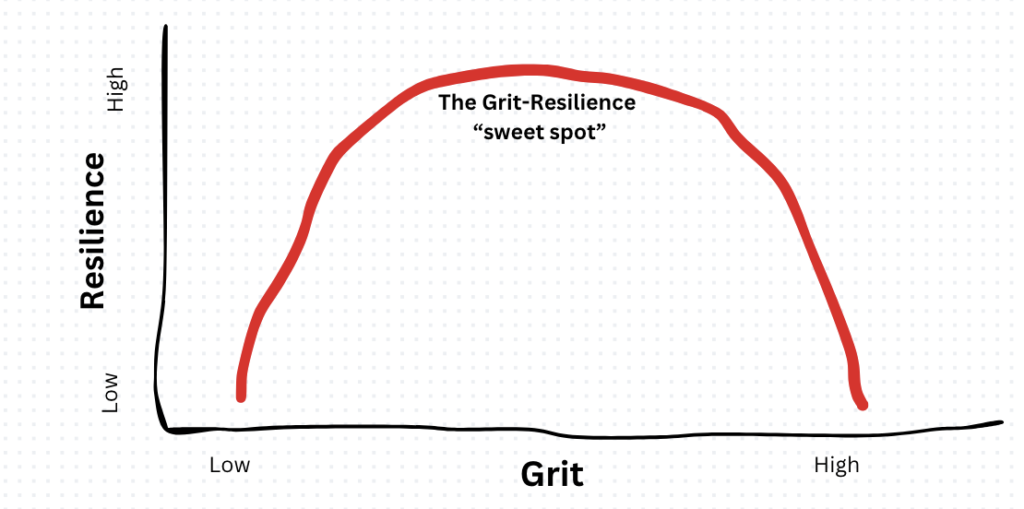First to resilience.
I have come to dislike that term as a result of how it, like so many other terms like it (mental toughness, anyone?) has been trivialised or even weaponised. Coaches who tell their athletes things like, you just have to get more resilient! Employers who run a two-hour resilience program and think their “resilience problem” is solved. Tick.
And yet, it does define an important quality in these stressful times. The ability to bounce back from or effectively endure hardship, mistakes, or failure.
To become more resilient, however, is more than merely knowing we should be. If it were that easy, we’d have all done it. But in the end, it’s not simply a choice. It’s a skill: how we mentally relate to or talk to ourselves about challenge and after failure.
Now to grit.
This is another term that gets a lot of airplay in the domain of high performance. Grit is the term that Angela Duckworth made famous in her book by the same name. It’s the combination of passion and perseverance that Duckworth found to be more important for long-term success than talent. Gritty people simply stayed the course longer than talented people. Grit was the secret sauce that allowed people in all sorts of fields to excel more durably. If talent is the raw ingredient, grit creates the behaviour and effort that brings the talent to life over time.
Grit is about effort and behaviour. Resilience is about mindset. When we stop fighting or undermining ourselves in our minds, we become freer to behave in ways other people would call resilient or gritty.
But it’s not as simple as wishing for more of both—more resilience and grit. I invite you to consider with me the possibility that grit and resilience have a more complicated relationship.

It stands to reason that low grit and resilience go hand-in-hand. This is the person who hasn’t experimented with harder effort so has no mental relationship at all with challenge. This is the person who doesn’t even try (out of ignorance or fear), is self-defensive, or who plays the “world is out to get me” victim card. Both grit/effort and resilience/mindset are “off.”
As we discover and apply grit to our endeavours, however, our resilience can’t help but grow. There’s a beautiful synergy around a strong challenge mindset and courageously going after what we really care about. That’s the top of the inverted U relationship: the grit-resilience “sweet spot.” For without resilience – the mindset that helps us weather adversity—grit can’t gain traction. Resilience can live without grit, but that’s not the domain of sustained high performance: mindset without effort doesn’t carry us very far.
But like all things, there is wisdom in moderation. I argue in my book, When Grit is Not Enough, that there are conditions, such as in times of change or uncertainty, where “gritting it out” may in fact be the wrong choice. I also speak to the tendency some of us hard workers have (and I count myself among them) who actually over-index on grit, to our performance detriment. And chronic over-gritting kills resilience. Trust me, I should know.
In that spirit, I have developed a quiz to try to measure where we sit on this grit-resilience continuum. I’d love for you to give it a try. Circle the letter that most applies to you in each of these scenarios:
1. When faced with a challenging long-term goal, do you:
a) Often give up or lose interest if you encounter setbacks.
b) Stay committed and keep working towards it despite obstacles.
c) Push yourself to the point that it impacts your well-being.
2. How do you handle failures or setbacks in your life?
a) Tend to view them as signs to abandon your goals.
b) See them as opportunities to learn and grow stronger.
c) Dwell on past failures as a way to whip yourself to more effort.
3. When setting a new goal, do you:
a) Prefer goals that are easily achievable and require minimal effort.
b) Set ambitious, but realistic, goals that challenge you in a healthy way.
c) Set very hard goals that may be unrealistic and stressful.
4. How do you approach your daily tasks and responsibilities?
a) Often procrastinate or avoid tasks that require effort.
b) Tackle tasks with determination and a sense of purpose.
c) Overcommit to tasks and become overwhelmed.
5. When you’re passionate about a project or hobby, do you:
a) Talk yourself out of it if it becomes too challenging or time-consuming.
b) Invest time and effort to improve and excel in that area.
c) Sacrifice other important aspects of your life to pursue your passion.
6. How do you react when you’re not immediately good at something new?
a) Get discouraged and give up if you’re not a natural talent.
b) Embrace the learning process and keep practicing to improve.
c) Push yourself hard, determined to succeed no matter what.
7. When you face a major life decision, do you:
a) Often avoid making a decision and hope things will work out on their own.
b) Weigh the options, choose thoughtfully, and take action.
c) Obsessively ruminate over the decision and struggle to move forward.
8. How do you handle stress and pressure in your life?
a) Tend to become overwhelmed and lose focus.
b) Stay composed and work through stressful situations effectively.
c) Take on too much and become overly stressed.
9. When you encounter criticism or negative feedback, do you:
a) Take it personally and feel demotivated.
b) Use it as constructive feedback to improve.
c) React defensively and dismiss or deflect it.
10. How would you describe your work-life balance?
a) Prioritize good times now over longer-term career or personal goals.
b) Strive to balance focus on yourself, your passions, and your responsibilities.
c) Sacrifice personal well-being and relationships for goals or career success.
Scoring is straightforward (I think…but you tell me!):
“a” responses suggest a tendency toward lower grit and resilience and a potentially lower ability to manage stress and challenge
“b” responses equal the grit/resilience “sweet spot”
“c” responses suggest a tendency toward over-gritting, a risk of lowered resilience and burnout.
I will be offering ideas in future newsletters on how to move from “a” or “c” to “b.” In the meantime, if getting your grit-resilience balance right is an issue for you, I can help. Ping me here.


